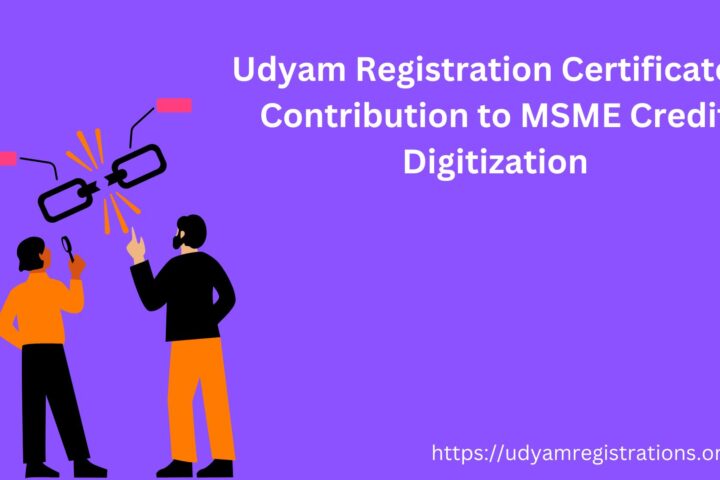Data Availability
The Udyam Registration Certificate collects and stores essential data about MSMEs, such as their turnover, investments, and employment. This data can be used by financial institutions to assess credit risks and make informed lending decisions.
Credit History
Over time, the portal can build a digital record of an MSME’s activities and performance. This historical data can be valuable for lenders in evaluating an MSME’s creditworthiness, as they can assess trends and patterns in the business’s operations.
Government Schemes and Subsidies
The Udyam Registration Certificate often links MSMEs to various government schemes and subsidies. Access to such benefits can improve the financial stability of these businesses, making them more creditworthy.
Transparency
The portal promotes transparency in MSME operations, as it requires businesses to update their information regularly. This transparency can increase the confidence of financial institutions in lending to these businesses.
Digital Documentation
MSMEs can upload various documents related to their business on the portal, which can be accessed by financial institutions when processing loan applications. This reduces the need for physical paperwork and speeds up the lending process.
Credit Access
The Udyam Registration Certificate, by promoting the formalization of MSMEs, can potentially improve their access to credit. Formal businesses are often seen as less risky by lenders.
Credit Scoring and Risk Assessment
Digital platforms like the Udyam Registration Certificate can potentially integrate with credit bureaus and other financial data sources to provide a more comprehensive view of an MSME’s credit history. This can enable lenders to assess creditworthiness more accurately.
Access to Finance
By making it easier for MSMEs to register and formalize their businesses, digital platforms can help them gain access to a wider range of financial products and services, including loans, lines of credit, and working capital finance.
Automation and Efficiency
Digital platforms can automate various aspects of the credit application and approval process. This includes document verification, credit scoring, and decision-making, which can significantly reduce the time it takes for MSMEs to access credit.
Data Analytics
The data collected through the Udyam Registration Certificate can be analyzed to identify trends and patterns in MSME behavior and performance. This data-driven approach can help lenders make more informed lending decisions.
Reduced Costs
The digitization of MSME credit processes can lead to cost savings for both MSMEs and financial institutions. MSMEs can save on administrative and travel expenses, while lenders can reduce overhead costs associated with manual processes.
Credit Monitoring
Digital platforms can enable real-time or periodic monitoring of an MSME’s financial health. Lenders can set up alerts or triggers to identify potential risks early and take proactive measures.
Financial Inclusion
Digitization can also promote financial inclusion by making credit more accessible to underserved and remote areas, where physical branches of financial institutions may be limited.
Government Support
If the government actively supports and promotes the use of digital platforms like the Udyam Registration Certificate for MSME registration and credit access, it can have a significant impact on digitization efforts.
Data Security and Privacy
It’s important to ensure that data collected and shared through digital platforms are secure and compliant with data privacy regulations to build trust among MSMEs and financial institutions.
Access to Finance
By making it easier for MSMEs to register and formalize their businesses, digital platforms can help them gain access to a wider range of financial products and services, including loans, lines of credit, and working capital finance.
Automation and Efficiency
Digital platforms can automate various aspects of the credit application and approval process. This includes document verification, credit scoring, and decision-making, which can significantly reduce the time it takes for MSMEs to access credit.
Data Analytics
The data collected through the Udyam Registration Certificate can be analyzed to identify trends and patterns in MSME behavior and performance. This data-driven approach can help lenders make more informed lending decisions.
Reduced Costs
The digitization of MSME credit processes can lead to cost savings for both MSMEs and financial institutions. MSMEs can save on administrative and travel expenses, while lenders can reduce overhead costs associated with manual processes.
Credit Monitoring
Digital platforms can enable real-time or periodic monitoring of an MSME’s financial health. Lenders can set up alerts or triggers to identify potential risks early and take proactive measures.
Financial Inclusion
Digitization can also promote financial inclusion by making credit more accessible to underserved and remote areas, where physical branches of financial institutions may be limited.
Government Support
If the government actively supports and promotes the use of digital platforms like the Udyam Registration Certificate for MSME registration and credit access, it can have a significant impact on digitization efforts.
Data Security and Privacy
It’s important to ensure that data collected and shared through digital platforms are secure and compliant with data privacy regulations to build trust among MSMEs and financial institutions.
Also read – nic code for manufacturing
Conclusion
Please note that while the Udyam Registration Certificate has the potential to contribute to MSME credit digitization, the actual impact may depend on various factors, including the adoption rate of the portal by MSMEs and financial institutions, as well as changes in government policies and regulations. It’s advisable to check for the latest developments and initiatives related to MSME credit digitization in India, as the landscape may have evolved since my last knowledge update in September 2021.

















